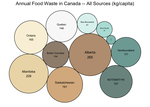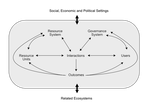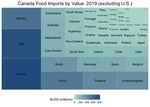Governing Regional Food
Understanding how we make collective decisions about food within our region.

This is an exciting time for food law and policy in Atlantic Canada. Not only are new local and regional food plans and legal reforms emerging, but the range of actors (governments, civil society organizations, community groups, and firms) working together to design and implement these changes is growing.
As a result, this is also a complex and sometimes confusing time for food law and policy. One set of reforms on an issue or in one part of the food system can have unintended consequences for other parts of that system and at different scales. Tracking who has the (formal and informal) power to make decisions is more difficult than ever. And while the work of lawyers and legal researchers often focuses on questions of legal authority and jurisdiction, we’ve conventionally lacked the tools to draw connections in complex systems.
What is “Food Systems Governance”?
“Food systems governance” is the process of making collective decisions together within and about the food system. “Government” refers to a centralized representative body, generally elected, that makes law and policy on behalf of its citizens (an Indigenous government, the federal or a provincial/territorial government, a local mayor and council). “Governance” refers to processes of collective decision-making, more or less decentralized, that involve a range of government and non-government actors.
Project Goal
This project aims to develop tools that help participants make sense of the decision-making environment in regional food systems governance (who the actors are, where they make decisions, and how issues or problems are interconnected).


